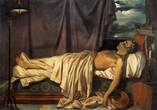day by day: a blog
September 01, 2009
nobility and poetry
 [Lord Byron on His Death-Bed, by Joseph-Denis Odevaere, about 1826] 'There is no element more conspicuously absent from contemporary poetry than nobility', Stevens wrote. Perhaps in a very literal way we should restore 'nobility' to the history of contemporary poetry, if for no other reason than because it seems foreign to the field? Stevens did not quite mean it in this way, but it is true to say that one sociological theme almost entirely ignored is the dynastic and aristocratic, the 'noble', dimension to a certain strand of English poetry.
[Lord Byron on His Death-Bed, by Joseph-Denis Odevaere, about 1826] 'There is no element more conspicuously absent from contemporary poetry than nobility', Stevens wrote. Perhaps in a very literal way we should restore 'nobility' to the history of contemporary poetry, if for no other reason than because it seems foreign to the field? Stevens did not quite mean it in this way, but it is true to say that one sociological theme almost entirely ignored is the dynastic and aristocratic, the 'noble', dimension to a certain strand of English poetry.
Think about this odd fact as you consider the general proposition. Between Lord Byron and Robert Lowell, a certain strand of self-consciously authoritative, seigneurial English male poets all had Plantangenet ancestors. Thus,
Byron was a 16 times great-grandson of Henry III of England (1207-1272)
Shelley was an 18 times great-grandson of Henry III
Tennyson was a 17 times great-grandson of Henry III
Swinburne was a 20 times great-grandson of Henry III
Eliot was an 18 times great-grandson of Henry III
Auden was a 20 times great-grandson of Henry III
Robert Lowell was a 21 times great-grandson of Henry III
These poets were all therefore distantly but discernibly related to one another. For example, Auden was
the 16th cousin, four times removed of Byron
the 16th cousin, three times removed of Shelley
the 14th cousin, twice removed of Tennyson
the 11th cousin, once removed of Swinburne
the 17th cousin, three times removed of Eliot
and the 18th cousin, once removed of Robert Lowell
Poetry has always been a tiny world. We always knew that, not without some anxiety. Perhaps it has also, in a certain way, always been a familial world? A world of hermetic 'connections'? Verbally and socially an aristocratic world? A world which has favoured the kind of imagination and speech patterns cultivated by people from a privileged class?
Personally, I find it unpleasant -- dismaying, unsettling, even -- to entertain the possibility that such notions as these are valid. Who wants to be in love with a corrupt medium? Who wants to entertain the idea that the sublimated version of an aristocratic voice is what one secretly, basely, in spite of oneself, worships in poetry, that this is what characterizes a kind of poem one reverences? There may be something here for people like me to face up to. Hypocrite lecteur, must I learn to believe that noblesse really does oblige?
Posted by njenkins at September 1, 2009 12:49 AM
With the exception of interspersed quotations, all writing is © 2007-09 by Nicholas Jenkins